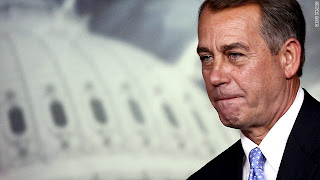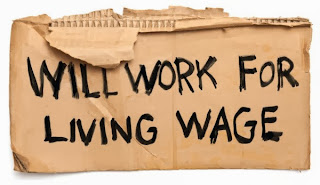








GOP House Speaker John Boehner & His RADICAL Tea Party "Henchmen" Insists On Trying To Force Their 21st Century Poverty Creation Debt Ceiling Bill Through Congress.
Thank God Senate Majority Leader Harry Reid Has Vowed It Won't Make It!
Pres. Obama Has Also Vowed To Veto Boehner's Bill Even If It Does Make It Through Congress.
Smells Like Doomsday For Bachmann, Boehner & Cantor.
You See Bachmann, Boehner & Cantor Are Career Politicians But The Tea Party Politicians Don't Seem To Really Care About Being Re-elected.
No, They ONLY Seem To Be Concerned With Destroying Pres. Obama's Presidency.
How Sad!
Pres. Obama Didn't Take Tea Party People Seriously Until After The November 2010 Elections When Democrats Lost The House.
Boehner & Cantor Didn't Take The Tea Party People Seriously Either.
Nevertheless Looks Like The Tea Party Movement Has Come Back To Haunt Them.
Boehner & Cantor Just Thought That Tea Party Populist Anger Would Propel Boehner & Cantor Into Leadership Positions, Then All Would Be Well.
WRONG!!
Now Look At The Huge Mess Our Country Is Facing.
The Entire World Is Watching As Bachmann & Palin's Tea Party Movement Is Destroying Our Nation!
How Sad!
By The Way Tea Party Politicians "WHERE ARE THE JOBS?"
IN 2012 ITS OBAMA OR THE TEA PARTY.....
I SAY CHOOSE OBAMA & REHIRE PELOSI IN 2012!!
Boehner Sees Passage of Debt Plan; Reid Vows to Kill It
The House and Senate headed for a pivotal showdown on Thursday evening over how to cut spending and increase the debt limit before the federal government loses its ability to borrow.
The House began debate and a vote was expected early this evening, with Republican leaders confident of winning over enough holdouts to pass their plan, which would make $900 billion in cuts, raise the debt ceiling for a few months, and come back for more of the same later. But Senate Democratic leaders said that if that happened they would waste no time rejecting the legislation.
Leaders of both parties and in both chambers said that it was essential to avoid a default on the federal debt, but that was practically all they agreed on.
The Senate majority leader, Harry Reid of Nevada, said Senate Democrats would move immediately Thursday night to set aside the House proposal if it wins passage and then take steps to force a vote on Mr. Reid’s own proposal to raise the debt limit through 2012 in exchange for more than $2 trillion in cuts.
“No Democrat will vote for a short-term Band-Aid that would put our economy at risk and put the nation back in this untenable situation a few short months from now,” Mr. Reid said.
But the House Republican leaders, all but declaring that they now had the votes in hand, said that would put blame for the continuing crisis on the Senate Democrats.
“When the house takes action, the United States Senate will have no more excuses for inaction,” said the House speaker, John A. Boehner, just before taking his bill to the floor for debate.
As they prepared to open debate, he and his fellow Republican leaders seemed confident that they would indeed pass the bill soon and send it to the Senate.
Lawmakers and top aides expressed confidence that they could win over enough members to prevent a humiliating defeat on the House floor for the speaker and the party. Even as they pushed for the plan, the leadership said the proposal fell short of their desires.
“Is this as much as I want? No,” Mr. Boehner told them. “But it advances our goals and doesn’t violate our principles.”
The White House spokesman, Jay Carney, said that a successful compromise would ultimately have to include not only significant spending cuts, but also a commitment to revamp the tax code and entitlement programs like Social Security and Medicare, and a debt ceiling increase generous enough to last through next year without a reprise of the standoff. He conceded that the chances were “not great” for a grand compromise before Aug. 2, which the White House has insisted is the deadline for extending the debt ceiling for paying the nation’s bills.
On the House floor, there were some Democrats who continued to call for including some kind of tax increase, like letting the Bush-era tax cuts for the wealthiest Americans lapse, but no matter how events unfold in the days ahead, that seems the unlikeliest of outcomes.
After the Republican caucus broke up, more than a dozen freshmen Republicans held a news conference Thursday morning outside the Capitol to voice support for Mr. Boehner’s plan. Several members interviewed said they would support the bill in an effort to avoid a possible federal default after the government’s borrowing power runs out next week.
“This is heartbreak, for a lot of us,” said Representative Sean P. Duffy, a freshman from Wisconsin. “We didn’t come here for this. But you know what? We’re going to swallow it and get the job done.”
Representative Nan Hayworth, Republican of New York, said the bill had been tweaked enough to gain her support, and she felt the mood in the party’s caucus to be moving in Mr. Boehner’s direction.
“This is what you’d expect thoughtful people to do,” Ms. Hayworth said. “People with passionately held beliefs can evaluate the evidence, and there has been a coalescence that is developing around the idea that the speaker has presented and an appropriately amended bill that represents a very productive and constructive approach to the challenge we face.”
As their leaders got a sense of exactly how many Republicans they could count on — they need at least 217 — there would be interesting decisions in the cloakroom about which members would be given a pass to go against the leadership, and which would have their arms twisted, despite the political consequences back home, where some freshmen may have a weak grip on their seats and some members may face intense primary challenges.
Democrats, too, huddled behind closed doors, preparing for the debate in the afternoon.
On the House floor, Democrats said that not just the economic uncertainty already brought on by the prolonged impasse, but also the short duration of the debt ceiling relief in Mr. Boehner’s bill, were hurting the economy and costing jobs.
Markets rose after a nervous opening, but the chief executives of the nation’s leading financial institutions warned of a “tremendous blow to business and investor confidence” if the votes in the House and the Senate this week, which are unlikely to produce an immediate agreement between the entrenched opponents controlling the two chambers, lead to a default once the government’s borrowing powers expire on Aug. 2.
As the House headed for its vote on Thursday, Congressional officials suggested that Senate leaders from both parties were keeping an open line for a potential compromise they could both brook. So far no such agreement appeared likely, and the Senate moved toward its own series of votes that could run through the weekend and perhaps into Monday, just one day short of Aug. 2.
At a House hearing on Wednesday, the president of Standard & Poor’s, one of the country’s largest credit rating agencies, said that while the United States was unlikely to default on its obligations, its credit rating could still be cut if Congress failed to come up with a plan to reduce spending sufficiently. In the markets, investors sought alternatives to Treasury bonds and pushed down American stock prices for the fourth straight day as reverberations from the legislative impasse appeared to take a toll. After closing down 198.75 points, or 1.59 percent, on Wednesday, the Dow Jones industrial average rose on Thursday and then fell back a bit..
Mr. Reid’s package would cut roughly $2.2 trillion in spending over 10 years and raise the debt limit through 2012, according to an analysis from the budget office. That allows him to raise the debt ceiling for much longer, past the elections of November 2012.
Assuming that the House is able to pass its bill on Thursday, the Senate has several options. Mr. Reid is expected to simply call for a vote to table the House measure, effectively killing it and depriving Republican senators of a chance to have a substantial debate on it.
Then he would call up his own proposal for debate. This weekend he would try to get the 60 votes needed — including at least a few Republicans — to cut off debate and have an up-or-down vote, which the Democrats would win but could not pass the House. Alternatively, while the debate dragged on in the Senate, he and the rest of the leaders of Congress would look for some kind of compromise.
House to vote on GOP debt plan; Senate Democrats promise to defeat it
House Republicans struggled Thursday to secure the votes necessary to pass Speaker John Boehner's plan to raise the nation's debt ceiling while enacting sweeping cuts in government spending -- the latest attempt to avoid an unprecedented national default and stave off potential economic catastrophe.
Boehner declared to reporters that the measure would pass in a vote set for later Thursday, but Majority Whip Kevin McCarthy, R-California, only would say progress was being made in rounding up the votes.
Another speaker at the news conference, Republican Rep. Renee Ellmers of North Carolina, let slip there's more work to be done, calling on House colleagues "who may not be there yet" but were "moving forward on those votes."
The vote in the House is scheduled for roughly 6 p.m. ET. Few if any Democrats are expected to back the measure. Assuming House Democrats remain united against the bill, Boehner will need the support of at least 216 of the House's 240 Republicans.
Whether Boehner can push the measure through remains an open question. Tea party-backed conservatives staged a virtual revolt against the bill over the past two days, complaining that it doesn't do enough to shrink the size of government and stem the tide of Washington's red ink.
"We don't have the votes yet, (but) we're going to get it passed," Boehner declared Thursday morning to his caucus, according to one Republican source who spoke on condition of not being identified.
Some Republicans have said this will be their last, best proposal. Senate Democrats, however, have warned the plan is dead on arrival on their side of Capitol Hill even if it passes the House.
Senate Majority Leader Harry Reid, D-Nevada, declared that the Senate is prepared to immediately vote on -- and defeat -- the speaker's plan Thursday night, assuming the House approves it.
"There are things that either side cannot get," Reid said Thursday morning, adding that Republicans need to "accept that and move on." Sen. Chuck Schumer, D-New York, called Boehner's proposal "a futile gesture."
GOP leaders responded by accusing the Democrats of playing political games.
"When is somebody on the other side of the aisle going to say yes?" Boehner asked. "We have a reasonable, responsible (plan). Let's pass this bill and end this crisis."
Senate Minority Leader Mitch McConnell, R-Kentucky, warned that "Democrats are playing with fire here."
"It's hard to conclude that they're doing it for any other reason than politics," he said.
As the political maneuvering continues, the clock continues to tick down. If Congress fails to raise the current $14.3 trillion debt ceiling by August 2, Americans could face rising interest rates and a declining dollar, among other problems.
Some financial experts have warned of a downgrade of America's triple-A credit rating and a potential stock market plunge. The Dow Jones Industrial Average fell nearly 200 points on Wednesday, but opened positively on Thursday on the basis of encouraging news from job and house markets.
Without an increase in the debt limit, the federal government will not be able to pay all its bills next month. President Barack Obama recently indicated he can't guarantee Social Security checks will be mailed out on time.
Regardless, some conservatives insist they won't back the Boehner plan or anything short of deep spending cuts, caps on future spending and a balanced budget to the U.S. Constitution. Rep. Phil Gingrey, R-Georgia, told CNN on Thursday morning that he's not on board.
"I love my speaker (but) we just keep spending," Gingrey complained. A balanced budget amendment is "the only way we can constrain ourselves," he insisted.
However, one of the GOP's party elders, Arizona Sen. John McCain, argued Wednesday that it's "worse than foolish" to suggest the current Congress will pass such an amendment by August 2. It's "bizarro," McCain said.
Leaders of both parties now agree that any deal to raise the debt ceiling should include long-term spending reductions to help control spiraling deficits. But they differ sharply on both the nature and timetable of the cuts. Republicans are seeking another vote on the debt ceiling before the 2012 election; Democrats call the demand a political nonstarter and economically destabilizing.
The Boehner and Reid plans both suffered setbacks earlier this week when the nonpartisan Congressional Budget Office released reports concluding that they fell short of their stated deficit reduction goals.
Specifically, the CBO concluded that Boehner's plan would cut spending by $850 billion rather than the $1.2 trillion proponents claimed it would save, which was below the $900 billion increase in the debt ceiling included in the measure.
Boehner has since revised his plan, and the CBO now estimates it would generate a total of $917 billion in savings over the next decade, an increase of about $65 billion over the initial version.
With the revisions, Boehner's proposal now meets his pledge to match any debt ceiling hike with dollar-for-dollar spending cuts.
Boehner's plan would require two separate votes by Congress, allowing for a combined debt ceiling increase of up to $2.5 trillion. In addition to imposing nearly $1 trillion in spending reductions, it would create a special congressional committee to recommend additional savings of $1.6 trillion or more.
Any failure on the part of Congress to enact mandated spending reductions or abide by new spending caps would trigger automatic across-the-board budget cuts.
The plan also calls for a congressional vote on a balanced budget amendment to the Constitution by the end of the year.
Boehner has promised anxious conservatives votes on two versions of a balanced budget amendment on Friday, according to GOP leadership sources.
One version, if adopted by the states, would require Washington to maintain a balanced budget. The other version, one that conservatives have long been pushing, would also require a super-majority vote in both chambers to approve any tax increases.
As for Reid's plan, a CBO analysis released Wednesday concluded it would reduce deficits over the next decade by $2.2 trillion -- $500 billion short of promised savings of $2.7 trillion. Democrats had been claiming their plan would meet the GOP's demand that total savings should at least match any debt ceiling hike through 2012.
Michael Steel, spokesman for Boehner, said Wednesday that the CBO analysis of Reid's proposal "shows the Senate plan for what it is: A grab-bag of gimmicks that gives the president a blank check."
Democrats responded by arguing that Reid's plan has more guaranteed savings than Boehner's. They also promised that the final version of Reid's bill will include more savings.
Reid's plan would cut spending by $1.8 trillion as part of the total $2.2 trillion in savings, according to the CBO. Roughly $1 trillion in the savings are based on the planned U.S. withdrawals from military engagements in Afghanistan and Iraq.
Limiting future discretionary spending would save another $751 billion, and an estimated $375 billion would be saved in interest payments due to reduced borrowing because of the spending cuts.
Reid's plan also would establish a congressional committee made up of 12 House and Senate members to consider additional options for debt reduction. The committee's proposals would be guaranteed by a Senate vote with no amendments by the end of the year.
Among other things, Reid has stressed that his plan meets the key GOP demand for no additional taxes. Boehner, however, argued this week that Reid's plan fails to tackle popular entitlement programs such as Medicare, which are among the biggest drivers of the debt.
Beneath the harsh partisan rhetoric, there have been signs of a growing recognition of a need for further compromise. Senate Minority Leader Mitch McConnell, R-Kentucky, called Tuesday for renewed negotiations with Obama, and indicated that his party must be willing to move away from some of its demands.
Sources close to the negotiations have told CNN that Vice President Joe Biden is very much in the mix of the back-channel conversations that are occurring on a possible fallback position.
Obama made a nationally televised plea for compromise Monday night.
A CNN/ORC International Poll reveals a growing public exasperation and demand for compromise. Sixty-four percent of respondents to a July 18-20 survey preferred a deal with a mix of spending cuts and tax increases. Only 34% preferred a debt reduction plan based solely on spending reductions.
According to the poll, the public is sharply divided along partisan lines; Democrats and independents are open to a number of different approaches because they think a failure to raise the debt ceiling would cause a major crisis for the country. Republicans, however, draw the line at tax increases, and a narrow majority of them oppose raising the debt ceiling under any circumstances.
Sources: AP, CNN, NY Times, Young Turks, Youtube, Google Maps







































































.jpg)























No comments:
Post a Comment